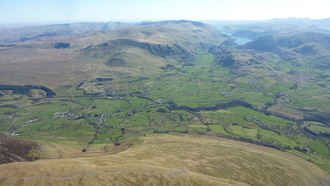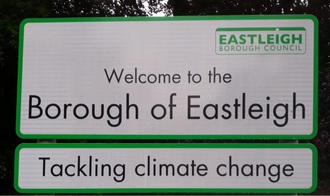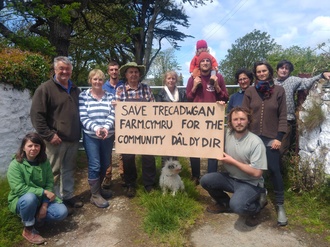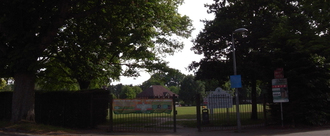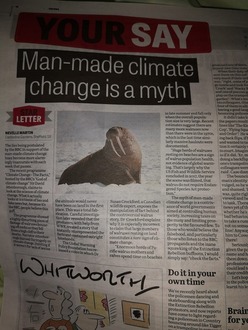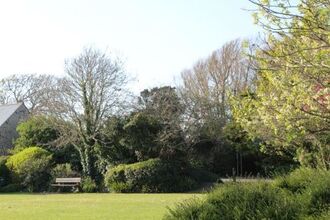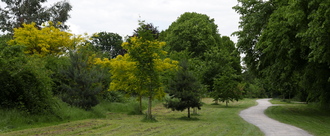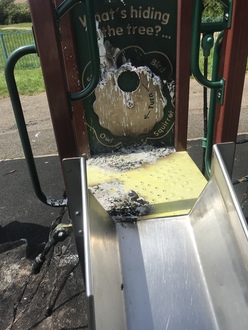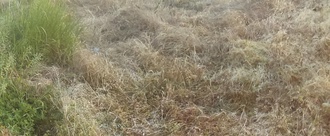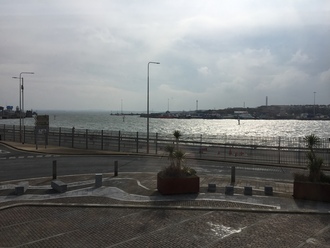-
STOP TARMAC ON KESWICK RAILWAY PATHThe Cumbria Wildlife Trust explains these sites have considerable nature conservation value in natural heritage for habitats and species of national importance. The LDNPA played a role when the CWS panel established the selection guidelines and will possess the landowner's leaflet! NB - Other associated plans went before the LDNPA this August, both including resurfacing: 7/2019/2165 and 7/2019/2188, and 7/2019/2190, a major tarmac plan. There were 26 letters of objection to 19/2165 including Keswick Town Council's. Compare with 7/2019/2178 announced on 23/8/19: terrestrial and aquatic species, European Protected Species -that need a licence - and the laws covering them! Biosecurity measures. The contrast is incredible, by the same authority! They are seriously threatened. You can make your views known on [email protected] quoting planning ref. nos. The laying of tarmac or any hard surface means it will literally be a case of life or death. Associated plan ref. 7/2019/2017 admits wildlife could be injured or killed! Wildlife and Countryside Act 1981. Forestry Act 1967 and Charter for Trees 2017 - over 1,300 lost, red squirrel woodland, more to follow as the project advances, another 74 in 2189,. The photograph shows the countryside where the railway path is hidden in the deep Greta gorge indicated by the line of trees crossing from east to west, just discernible! Keswick is not far to the west. Study 7/2019/2189 and gasp at the actual process of path 'construction' along this 4-mile length! On Wed., 2/10/19 Keswick Town Council is meeting the LDNPA, originally to discuss tarmac proposals, but CEO Richard Leafe has told them that instead, LDNPA intends to tell them how it will be done! See below for the Sandford Principle. We consider they consider they are contravening their legal environment remit ie it is illegal, and without justification. The footpath lies at the bottom of the deep, steep-sided narrow gorge of the River Greta, for miles barely discernible from the A66 above, and tributary to the Derwent catchment area part of the National Trust's Riverlands project that could be compromised. Embodied in the 1995 Environment Act, ie law, their duty under the Sandford Principle is to give priority to the environment where there is a conflict with public interest. This is what they say they will do on their Unesco nomination form. As an optional 4-5 mile section of the long Coast 2 Coast (C2C) route only since the 1990s, cyclists' interests should not take priority over other users .This is not a road, but primarily a decades-old footpath where cyclists are allowed and not vice versa and aren't cyclists a type of traffic? Resurfacing plans now give them priority, cycle track standard. Isn't this dangerous on a Multiuser Trail with increased accident risk? The LDNPA also has a duty to honour their commitment to the 2 Partnerships of which they are a member: the Cumbria wildlife Sites and the Derwent and South West Catchment Area. The John Muir Trust has a 'Keep it wild' policy that would equally apply here! Environment Secretary Theresa Villiers addressed the recent UK National Parks Conference by video link, saying that at the core of government policy is "nature recovery and protecting biodiversity" - a LDNPA delegate would have been there. The UK is already one of the most nature-depleted countries, hence the Government's 25-year Environment Plan and 'biodiversity net gain' - it can only lose with these plans. Nor do they comply with their NP second role of helping mitigate climate change, very high priority now, from government, the Cumbria County and Keswick Town Councils. 2 years of vehicle and machinery movement in that confined space and outside Keswick, plus tarmac fumes in the gorge and from Keswick station itself passing through residential areas.3,038 of 4,000 SignaturesCreated by Carol Smith
-
Reduce single-use plastic waste in ChesterfieldIn 2016, the Ellen MacArthur Foundation estimated that by weight, there could be more plastic in our oceans than fish, as soon as 2050. Plastics are durable, strong and long-lasting – all positive elements until you realise that they will stay in our environment for up to an estimated 600 years. (Columbia University) Over 300 million tons of new plastic are made every year – half of which is for single use plastic, such as packaging and convenience foods. In many cases, such as plastic straws, takeaway food containers and coffee cups, there are practical alternatives available that are either reusable or sustainable. It is estimated that there are over 5.5 trillion pieces of plastic currently in our global ocean and over 8 million tons of plastic are dumped into our seas each year. This equates to one refuse truck FULL of plastic every minute. Marine plastic leads to coastal / offshore dead zones, entanglement, death through ingestion, toxic transfer and, once degraded into microplastics, contamination of the food chain – including our own. We are quite literally eating the plastic that has ended up in our seas. Sign this petition so we can persuade the council to act on the issue of single-use plastic waste. *Image credit Ed Fordham taken at Chesterfield Borough Council, June 2019103 of 200 SignaturesCreated by Greg Hewitt
-
Please Declare a Climate EmergencyWe have less than 11 years to take urgent action to limit global warming to 1.5°C or we risk catastrophic and irreversible runaway climate change; this was the stark warning from the Intergovernmental Panel on Climate Change (IPCC) report Global Warming of 1.5°C. Humans have already caused approximately 1.0°C of warming, the devastating impacts of which have been seen around the world in the form of reduction of sea-ice in the Arctic, loss of coral reefs and extreme weather events. Warming greater than 1.5°C will result in grave consequences for our local and global environment. Rising sea levels and uninhabitable areas will displace millions of people worldwide. Shifting weather patterns, heightened risks of extreme weather events such as floods and droughts and the demise of insect species will result in global famine, water shortages and soil infertility. But it’s not too late. The IPCC report says that limiting Global Warming to 1.5°C may still be possible - but it will require ambitious action from national and sub-national authorities, civil society, the private sector and local communities.628 of 800 SignaturesCreated by Laura Palin
-
Save Trecadwgan Farm for the CommunityTrecadwgan is a historic place, dating back to the 15th century with links to a Welsh Prince named Cadwgan. It is in an ideal place for a community run farm based on the principles of Food Sovreignty, Agroecology and Biodynamic Agriculture. The is an opportunity to create something wonderful for generations to come if the county council are prepared to work with us and cancel the auction.1,502 of 2,000 SignaturesCreated by Rupert Dunn
-
Save Our Park...Save the PlanetSurrey Health Borough Council is planning to dispose of more than 20% of the land at the London Road Recreation Ground, Grand Avenue, Camberley to use as a car park for the redevelopment of the Arena Leisure Centre. This is a significant reduction in open, green recreation space available to the local residents in an area that already has a minimum of such areas. This disposal of land will greatly affect the functionality of the recreation ground, the available space for residents to enjoy green open spaces and cause the loss of a significant environmental habitat for plants and animals.2,175 of 3,000 SignaturesCreated by Southwell Park Residents' Association
-
Sheffield Star must tell the truth about climate catastrophe.On May 31st 2019 the Sheffield Star published a letter with a bold headline saying "Man-made climate change is a myth". The contents of this letter have been thoroughly debunked in this article. http://www.lse.ac.uk/GranthamInstitute/news/climate-change-deniers-haul-out-a-daft-conspiracy-theory-about-attenboroughs-new-programme/ Not only did the Star print the climate deniers letter without checking it was factually correct, but they also chose to give it "Star letter" treatment and print a headline that is entirely opposed to scientific fact. The Star must stop misinforming the public and start to educate them about the massive issue of climate and ecological catastrophe. Unless the public understands the dire consequences of continuing "business as usual", it will be impossible for the Government to implement the emergency measures required to prevent mass extinction. Newspapers that actively oppose the measures required to stop climate and ecological catastrophe will be complicit in both genocide and ecocide. The science is clear: It is understood that we are facing an unprecedented global emergency. We are in a life or death situation of our own making. We must act now. “We are in a planetary emergency” Prof. James Hansen, former Director of the NASA Goddard Institute for Space Studies “Climate change is a medical emergency…It thus demands an emergency response…” Prof. Hugh Montgomery, director of the University College London Institute for Human Health and Performance, Lancet Commission Co-Chair “This is an emergency and for emergency situations, we need emergency action.” – Ban Ki-Moon, former UN Secretary-General “Act now to save our planet and our future from the climate emergency.” Antonio Guterres UN Secretary-General At the end of 2018, the UN Secretary-General warned us: "Humanity and life on Earth now face a ‘direct existential threat’ The world must act swiftly and robustly to keep global warming under 1.5°C and try to avoid utterly catastrophic impacts to life on Earth. Human activity is causing irreparable harm to life on this world. A mass extinction event, only the sixth in roughly 540 million years, is underway. Many current life forms could be annihilated or at least committed to extinction by the end of this century." The air we breathe, the water we drink, the earth we plant in, the food we eat, and the beauty and diversity of nature that nourishes our psychological well-being, all are being corrupted and compromised by the political and economic systems that promote and support our modern, consumer-focused lifestyles. We must act while we still can. What we are seeing now is nothing compared to what could come. Effects on global human society, if the climate and ecological emergency are not addressed, may spiral out of control. Sea level rise Desertification Wildfires Water shortage Crop failure Extreme weather Millions displaced Disease Increased risk of wars and conflicts But our leaders are failing in their duty to act on our behalf. Our current systems of governance are compromised by a focus on profits and economic growth. Politicians can be influenced by lobbies of powerful corporations and the media are hampered by the vested interest of corporate advertisers undermining our democratic values. We have run out of the luxury of time to react incrementally. We must radically and immediately begin reducing emissions and improving carbon absorption, drawing it down and locking it up again. Only a peaceful planet-wide mobilisation of the scale of World War II will give us a chance to avoid the worst-case scenarios and restore a safe climate The task before us is daunting but big changes have happened before. Let’s make a better world. (Thanks to Extinction Rebellion for this text)430 of 500 SignaturesCreated by Graham Wroe
-
STOP the Penrith 'pong'Disgusting smell pollutes the air residents breathe. It is sickening, so residents are objected - without choice - to the horrible smell in their nostrils, in their homes, on their clothes. Plus, the smell distracts tourists to the area ie: it harms the tourist trade.1,368 of 2,000 SignaturesCreated by jeff thomson
-
Save our recreation grounds, Keep doctors in Seaford town.Save our recreation grounds: Seaford in East Sussex has a serious, and recognised, lack of outdoor recreation and sports facilities for its growing population. Our grounds at the Downs Leisure Centre include: playing field, garden and an over 60s club. All at risk of being permanently lost and tarmacked over. It’s accepted by doctors and common knowledge that fresh air and open, green spaces are vital for mental and physical health for all ages. Our green spaces at the Downs site are in constant use by young and old. They're also vital habitats to a host of birds, insects and other creatures in the trees, hedges, plants, grass and soil. As we face a worldwide climate crisis, green space isn’t a ‘nice to have’, it’s an essential part of supporting pollinators and a whole delicate, interconnected ecosystem. These grounds are the last remnants of open space in this part of Seaford. Documents reveal that historic buildings thought to pre-date 1624 are still on what was once rural and common land. In fact, these public recreation grounds were gifted to the people of Seaford for health and leisure since 1964, until now. It's a space where we can come together, kick a ball, picnic, walk and play together. We absolutely do not want to lose this right. Which is why, when we made a formal presentation to the Scrutiny committee at Lewes District Council on 10 September 2019, we asked that the open green space be protected for ever and turned into a public park. Keep doctors in Seaford town: Currently people from all over Seaford can reach the two doctors’ surgeries in the town. Seaford is a one-stop centre for everyone. Patients who visit the surgeries in Seaford also go shopping and catch up with friends in the town’s many cafes. This vibrant town community, and vital trade, could easily be lost if both surgeries are moved to the Downs Leisure Centre site. At a time when the UK’s high streets are under serious threat, we need to be investing in the town centre and keeping it thriving, rather than driving footfall away from the area. Relocating both surgeries to the Downs Leisure Centre and building a supermarket on site will encourage more car use, leading to traffic congestion and pollution which will change the local area beyond recognition. Plus, the development will significantly increase parking demand – and the planned parking is woefully insufficient. There are empty and underused premises in the town centre. No clear reasons have been given about why the NHS doesn’t invest in its existing premises which occupy a large space in the town centre. It is not our Council’s legal or core responsibility to fund NHS facilities. The seizure of green recreational space to build a supermarket and £18 million doctor’s surgery is unprecedented. No other council has proposed this before. As residents of Seaford, we value the fresh sea air, outdoors green space, beautiful natural environment, active lifestyle, vibrant town centre, and sense of community. But if the council gets the go ahead with this development, it will use an £18 million public works loan to finance an NHS project - with no new medical services on offer. We do NOT want a development that builds a supermarket, housing, car parking and medical centre over our green space. The development will degrade the natural environment, increase congestion, pollution and the likelihood of accidents. It will further social isolation, reduce ways of keeping active and seriously affect trade in the town centre. To stop this development, please sign our petition to Lewes District council and Eastbourne, Hailsham and Seaford Clinical Commissioning Group. IMPORTANT UPDATE: There will be a critical public meeting at 6 pm on Wednesday 25 September 2019, when Lewes District Council debate this petition and consider whether or not to build a Health Hub on the Downs Leisure site. We need your support. Please join us. We're meeting outside at 5.30 pm on the 25th at: Council Chamber at County Hall, St Annes Crescent, Lewes. Links: 'Town Centres could become ghost towns', BBC, July 2018 https://www.bbc.co.uk/news/business-44695269 'NHS battle plan to save millions of lives: Lifestyle changes to solve health', The Express, April 2019 https://www.express.co.uk/news/uk/1116288/nhs-health-crisis-exercise-britain-matt-hancock "Evidence showed that concrete gardens had no effect at all, so you had to have green gardens." 'Top doctor backs green gym idea.' BBC news 2014 https://www.bbc.co.uk/news/science-environment-26871970 'UK parks save NHS more than £111m a year, study suggests. Fields in Trust charity say regular users are likely to be healthier and visit GPs less often'. https://www.theguardian.com/uk-news/2018/may/07/uk-parks-save-nhs-111m-year-study-suggests 'Doctor's new prescription: "Don't just exercise, do it outside" '. https://www.theguardian.com/lifeandstyle/2015/feb/10/health-prescriptions-doctors-healthcare-fitness-exercise-parks 'One of our key areas of expertise is the interface between green space and health from programmes on the ground to strategic work at national level'. https://sustainablehealthcare.org.uk/what-we-do/green-space-and-health A host of research at https://nhsforest.org/evidence-benefits points to the health of patients, staff and local communities can be dramatically improved by providing opportunities to exercise outdoors and access green space.1,205 of 2,000 SignaturesCreated by Julia Howe
-
Save our green spaces in SpelthorneSpelthorne Council has published a consultation document which will strip 71 green spaces in Spelthorne of their existing protection as Protected Urban Open Spaces (PUOS). [1] In their consultation document, the Council are proposing very onerous criteria for a new designation as ‘Local Green Space’ which – according to our detailed analysis – only one of the 71 currently protected public urban open spaces in Spelthorne can meet and which would leave our valued Green spaces at risk of development. [2] As an example, the Council proposes that only urban spaces that are at least 0.25 hectares in size should be protected as local green spaces. This requirement automatically leaves 14 (~ 20%) of the 71 spaces (ranging from 0.07ha to 0.24ha) unprotected. The other proposed criteria mean that 56 out of the 57 remaining sites will not be considered as having enough ‘historic significance’ (e.g. because they don’t contain a combination of ancient monuments or listed buildings), “richness of wildlife” (because there currently is no evidence of “observed wildlife on site” and/or closeness to local nature reserves), recreational value (because they don’t possess “good” or “excellent” free recreation facilities) or are not considered tranquil or beautiful enough. It would not only be an immense loss to residents to lose important local green spaces – but a national tragedy when we already know that we only have 12 years to avert irreversible climate change. [3] NOTES: [1] https://www.spelthorne.gov.uk/article/17625/Consultations-and-representations [2] https://www.spelthornegreencllrs.com/news-media [3] https://www.theguardian.com/environment/2018/oct/08/global-warming-must-not-exceed-15c-warns-landmark-un-report3,380 of 4,000 SignaturesCreated by Spelthorne Green Belt Campaign
-
Camps hill new parkSince this park burnt down my kids have been really upset. They were big fans of the park, like many any other children in our local area and they really enjoyed playing in this park. I've started this petition calling on the council to invest in this local treasure. So many local children would benefit from some more swings, a slide and some simple climbing equipment. It's not a-lot to ask for the council to replace what has been damaged. Parks are extremely beneficial for young children, it's where they can play, learn and take time out from their phones and technology. Please sign this petition and provide local children with a fun, safe place to play.236 of 300 SignaturesCreated by Noreen Nawaz
-
Stop spraying weed killer in public areasThese chemicals have devastating effects on wildlife and there is a possible link with cancer. Teignbridge District Council have declared a Climate Emergency and part of this is the Ecological Emergency. Species are going extinct by the thousand each year.213 of 300 SignaturesCreated by Bee Helen
-
SAVE OUR HISTORIC HARBOUR - HOLYHEADHolyhead Harbours proposed port expansion by STENA, includes the RECLAMATION of the INNER HARBOUR, including destroying the HISTORIC CLASS II LISTED HARBOUR WALL. As well as destroying the history of Holyhead, the port and all its NOISE/POLLUTION will be even CLOSER to local RESIDENTS. We urge the government to rethink the proposals and expand the port further out to sea away from residential areas. The current levels of noise/pollution are already unpleasant to live with, DISTURBING SLEEP and the smell of DIESEL FUMES inside houses. The proposed plans for the new reclaimed land will be used to store Lorry Trailers, which will be very unsightly to the very important tourist trade, deeply affecting local businesses. PLEASE STOP THIS HAPPENING.465 of 500 SignaturesCreated by Port Expansion Community Group
Hello! We use cookies to improve your experience by providing insights into how the site is being used. Find out more.
